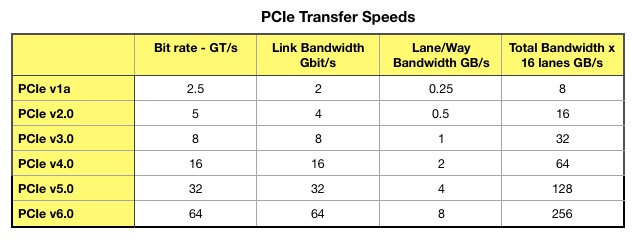Let’s end the week with some storage news stamps for your album. Slot in our PCIe v6 and v4 items, HPE snuggling closer to Qumulo, FileShadow adding file tagging, Hazelcast getting in-memory compute development cash, and…
PCIe v6.0
The PCIe SIG has announced v6.0 of the PCIe spec, less than a month after the V5.0 spec went live. It doubles PCIe 5.0 speed to 64GT/sec and 256GB/sec across 16 full duplex lanes, as the table shows:

This represents an eight-fold increase on today’s PCIe v3.0 speed for endpoints such as graphics cards, SSDs, Wi-Fi, and Ethernet cards.
V6.0 PCIe specifications include PAM-4 ((Pulse Amplitude Modulation with 4 levels) encoding, low-latency Forward Error Correction (FEC), and maintain backwards compatibility.
The need for this speed and the fast development of quicker PCIe comes down to CPUs and GPUs greedily taking in data for AI and machine learning, as well as the usual suspects of high-performance computing and general networking and storage needs.
Storage class memory is coming and that will take in and write data fast to/from memory or through a direct PCIe pipe. Both cases need the ability to read and write data faster to/from peripheral devices through a PCIe link.
NVMe devices should run faster as well.
PCIe SIG (Peripheral Component Interconnect Special Interest Group) members can find out more here.
PCIe v4.0 and Toshiba
Toshiba is developing SSDs using the PCIe 4.0 spec, which doubles PCIe v3.0 speed. Tosh subsidiary Toshiba Memory America Inc. tested prototypes and engineering samples of PCIe v4.0 SSDs at the PCI-SIG Compliance Workshop #109 in Burlingame, California.
Compliance testing is completed against both PCI-SIG maintained systems and other manufacturers of PCI products.
Kazusa Tomonaga, senior SSD marketing manager at Toshiba Memory America, said: “We are pleased with the results of the early testing at the PCI-SIG 4.0 workshop. We are on track and moving forward with our release plans for PCIe 4.0-capable SSD products.”
Blocks & Files thinks this will happen in 2020. Maybe other vendors will go direct to v5. We reckon PCIe v5 and 6 might overlap in 2021. It’s a peripheral interconnect speed feast.
HPE hugs Qumulo
HPE has extended its reseller agreement with Qumulo to include the public cloud. Previously the company sold Qumulo’s high-performance parallel file system software running only on HPE ProLiant and Apollo servers on-premises.
HPE said its customers can use Qumulo’s hybrid cloud file software to gain real-time visibility, scale and control of data both on-premises and in public clouds, including Amazon Web Services and Google Cloud Platform. Qumulo enables data replication between clouds for migration or multi-copy requirements.
Qumulo’s software does not support Azure.
File tagging by FileShadow
FileShadow has added custom tagging capabilities, user-created metadata, to improve file classification and selection.
The FileShadow products, hosted on Google Cloud and IBM Cloud, combine remote and local files into a metadata-described vault, making their files and photos searchable and available.
That means files in cloud storage accounts – Box, Dropbox, Google Drive, OneDrive, OneDrive for Business, Adobe Creative Cloud and Lightroom, iDrive, and local storage.
Local storage encompasses MacOS, Windows Desktops, Windows Virtual Desktops, Drobo network and direct attached storage (NAS/DAS) and Drobo NAS appliances.
Automatically-generated metadata includes location (GPS), optical character recognition of PDFs and machine learning-generated tags for images. A picture of someone golfing might automatically generate tags such as golf, golf ball, golf club, golf course, professional golfer and sand wedge, even if those terms are not in the file name.
Users can select one file or as many files as they want to adjust. They can add new tags, or edit or remove any auto-generated tags that aren’t relevant to their files in the vault.
Tyrone Pike, CEO of FileShadow, came up with a canned quote; “With FileShadow, customers can collect all of their content, and fine-tune the metadata tags so they can efficiently locate their files.”
FileShadow is free of charge for up to 100GB of data. Subscriptions are available for more storage ($15/month for 1TB; $25/month for 2TB; each additional terabyte is $10/month). Subscriptions for FileShadow for Virtual Desktops are available for $25/month for 2TB, and each additional terabyte is $10/month.
Hazelcast gets lots of $ for in-memory computing
Hazelcast, an in-memory computing startup, has nabbed $21.5m of D-round funding, taking the total raised to $30.5m. It was founded in 2008 and took in a $2.5m A-round in 2013, an $11m B-round in 2014. Five years on and it’s got a larger slug of cash to speed its product roadmap and beef up its sales teams.
Hazelcast has come up with a frankly awful marketing term, saying it provides a System of Now. It defines this as an ultra-fast processing architecture for mission-critical applications where microseconds matter. The old “real-time” term doesn’t cut it any more. Sigh.
A canned quote from Kelly Herrell, Hazelcast CEO, goes like this: “Hazelcast enables its customers to establish a System of Now through its platform that scales linearly and delivers the industry’s fastest processing for stored and streaming data, leaving competitive offerings far behind as data sizes and processing loads grow.”
Hazelcast said its annual recurring revenue has grown 300 per cent in the past three years, without providing any base revenue numbers. A useless claim then. More substantively, the CEO’s blog claims hundreds of commercial customers worldwide.
Shorts
Actifio, the copy data management software vendor, announced Multi-Cloud Mobility and Automation, providing enterprises with disaster recovery (DR) by using the on-demand capabilities of Amazon AWS, Microsoft Azure, Google Cloud Platform, and IBM Cloud. It said DR is a killer app for the public cloud and it provides it at the lowest cost, with no fear of lock-in to any cloud platform.
Cisco and IBM are announcing support for IBM Cloud Private on Cisco HyperFlex and HyperFlex Edge hyperconverged infrastructure. They want to have a common developer experience across on-premise and cloud environments. Read a blog about it here.
Cloudian announced a fully native S3-compatible object storage offering for VMware Cloud Providers that is managed directly from VMware vCloud Director. VMware Cloud Providers can deploy Cloudian as a storage appliance or as software-defined storage anywhere in the world, and vCloud Director manages the storage, from a single location if desired, and provides native automation of workflows.
DDN said it has captured the number-one spot in the IO500 10-node benchmark, announced today by the Virtual Institute for IO at ISC in Frankfurt, Germany. DDN ranked in three of the top five system results as well.
Global Computing Components, a specialised business within Tech Data, has signed a pan-European agreement with Toshiba to offer its client and enterprise internal hard disk drive (HDD) portfolio to customers.
Email cybersecurity firm Mimecast will be opening a new London office in November. It’s a 79,000 sqft unit at 1FA Broadgate.
Hyperconverged software vendor Pivot3 is partnering with Red River, a company providing IT to US federal agencies. Rance Poehler, chief revenue officer at Pivot3, said; “The federal channel is critical to Pivot3’s growth and success.” The partnership comes after the two have won a few federal deals that indicated they could do more if they got organised to work closer together.
The UK’s Coventry University is using Rubrik products to protect its user and research data across Nutanix, Microsoft and AWS environments.
Scale Computing, a hyperconverged systems vendor, announced its KVM-based hypervisor in its HC3 product family is supported by Parallels Remote Application Server 17 (Parallels RAS). This enables administrators to rapidly provision and manage virtual machines (VM) thin clones centrally from Parallels RAS Console to make VDI solutions faster, more affordable and easier to use.








